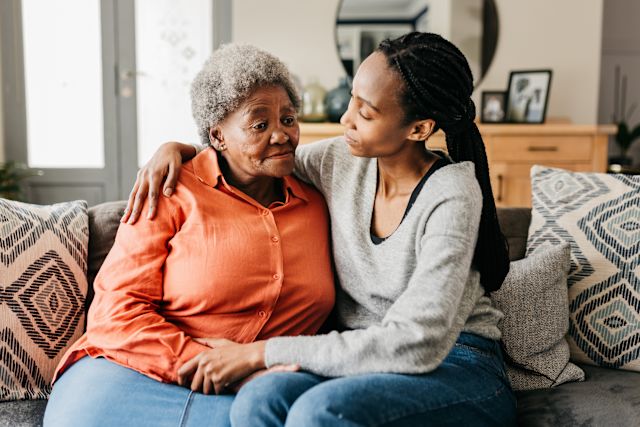Updated on March 24, 2025.
About 14 percent of adults in the United States provide unpaid care for an older person, according to a 2023 Bureau of Labor and Statistics report. In many cases, the person receiving care has a chronic illness or other well-being issues related to aging. They may have more trouble sleeping, getting around, and doing everyday tasks. Feelings of sadness, loneliness, or isolation are common, especially if a spouse or partner has passed away.
Over time, these challenges can contribute to depression, a serious mental health disorder. It’s different from temporary sadness, which everyone experiences on occasion. Depression occurs when sadness persists for two weeks or longer and interferes with day-to-day living. It’s common among older adults, and may show up as numbness, disinterest, or a general slowing down.
When someone you care for develops depression, it can complicate your job and affect your own mental and physical health. Fortunately, effective treatment is available—and it can improve quality of life for everyone involved in caregiving.
Depression signs in older adults
About 4 percent of people ages 70 and older have depression, according to the Centers for Disease Control and Prevention (CDC). Loneliness is a major risk factor, and it’s generally more common in people with sleep problems, trouble with daily function, or a chronic illness. If a person has more than one chronic illness—very common among older adults—the risk for depression rises.
Older people can have different depression symptoms than younger people. Their symptoms may be confused with symptoms of other illnesses or issues related to natural aging. In addition to persistent sadness, these symptoms can include:
- Feeling nothing; apathy or emotional numbness
- Feeling hopeless, guilty, worthless, or helpless
- Irritability
- Low energy, including slower movement or speech
- Issues with focus, memory, or thought
- Lack of interest in activities formerly enjoyed
- Aches and pains, including headaches, cramps, or digestive troubles
- Changes in appetite, or weight gain or loss
- Changes in sleep, including oversleeping or trouble sleeping
- Increased drug and alcohol use
- Thinking about death or suicide
If your loved one has expressed thoughts about dying or suicide, reach out to a healthcare provider (HCP) right away or call, text, or chat 988 to reach the 988 Suicide and Crisis Lifeline. Skilled counselors are available 24/7 to help them get the care they need.
How depression affects caregiving
If you’ve been a caregiver for any length of time, you’re likely familiar with the tasks involved. Caregivers must manage daily medical, household, financial, and personal responsibilities for their loved one, often with little or no help. It can be overwhelming, and many caregivers experience poor sleep and high levels of stress. Burnout, or a feeling of mental and physical exhaustion, is common.
If your loved one develops depression, these issues can become amplified. Over time, it can worsen your loved one’s existing medical conditions and may even lead to new health issues. As your loved one’s energy and motivation wane, their ability to participate—even in simple activities—may diminish and disappear. You may have to take on newer, more demanding tasks. You may feel drained, powerless, and angry.
"One of the most difficult parts for family members is understanding this illness, especially if the members have never experienced depression firsthand," says Lisa René Reynolds, PhD, a marriage and family therapist in Bantam, Connecticut. "Feeling resentful about pulling all the weight, worry about the increased chance of self-harm, lack of control over fixing the situation, and frustration or anger are all common thoughts and feelings," she explains.
But there is help. Learning about depression, especially among older people, is a wise first step. Reynolds recommends that caregivers get to know the illness by talking to a healthcare provider (HCP), or learning about depression from reputable sources, such as the National Institute on Aging or the National Council on Aging. The better you understand what’s happening, the more equipped you’ll be to take action.
Talking about depression treatment
To protect your depressed loved one's health and wellness, as well as your own, it's important that they receive professional treatment. The goal of treatment is to alleviate depression symptoms and help them get back to doing the things they used to enjoy. It often involves medication, therapy, or a combination of the two, and it’s frequently covered by private insurance, Medicare, or Medicaid. Treatment can improve your loved one's daily life, as well as your own.
While treatment is essential, talking to your loved one about depression symptoms can be a sensitive situation. Older people may be unused to or uncomfortable with discussing their feelings. If you are fearful of approaching your loved one, keep in mind that people who are depressed want to believe there is hope for happiness. Avoiding the subject means postponing or never receiving treatment.
Before starting the conversation, consider enlisting family, friends, or a trusted HCP to participate. Be aware that in some cases, the depressed person may be more likely to listen to a friend or HCP than to a close family member.
During the talk, you may want to try the following tips:
- Let them know you're concerned and want them to feel happier.
- Ask questions gently and allow them to express their feelings if they so choose.
- Emphasize the importance of treatment.
- Be aware of seeming to take control away; help them maintain some sense of control.
- Suggest different options for treatment, such as seeing a therapist, going to an HCP for antidepressants, or talking to a counselor or clergy member.
Ultimately, it doesn't matter how your loved one gets help, as long as it happens. The faster you begin the conversation, the faster you can find relief.







